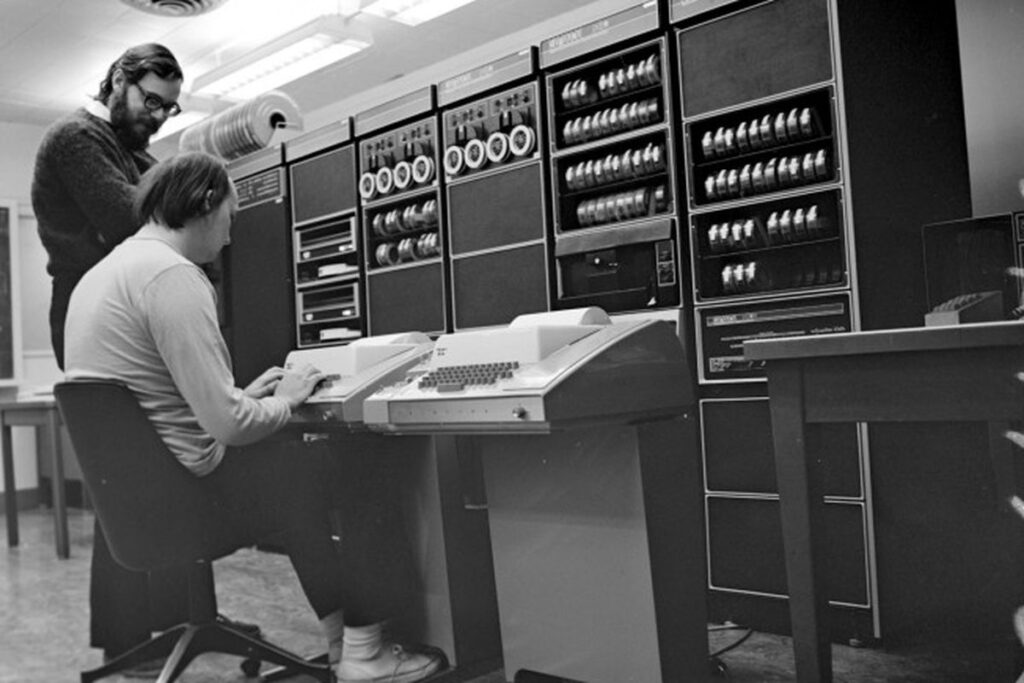Dennis Ritchie, a computer scientist is most popularly known for creating the C programming language. Dennis grew up in Brooklyn, New York, and attended ‘Summit High School’ in Summit, New Jersey. He was a star student in the classroom, earning consistently good grades.
He went on to study applied mathematics and physics at Harvard University. When he started working at Bell Labs in 1967, he began working on his PhD. However, he was not able to complete his education. At Bell Labs he made friends with Ken Thompson and together they began developing the ‘Multics’ operating system. Dennis invented the programming language ‘C’ and the operating system ‘Unix’ while working at the University of California, Berkeley.

Over time, Unix operating system gained popularity, and C programming language became the most widely used. Dennis and his colleague Ken Thompson received a ‘Turing Award’ in 1983 for their contributions to computer science field. Along with the “National Medal of Technology,” Dennis and Ken were honored with Japan’s “Japan Prize for Information and Communications Technology.”
Childhood & Early Life
Alistair E. Ritchie and Jean McGee Ritchie welcomed Dennis MacAlistair Ritchie into the world on September 9, 1941, in Bronxville, a wealthy New York City neighborhood. Bill and John were his older brothers, and he also had a sister named Lynn as a younger sibling. During Dennis’s childhood, his father had worked for a company called Bell Labs for many years.
Among the scientific world, he was well-known for his contributions in the field of electrical engineering. Co-authoring the book on switching circuit design was another notable accomplishment for him. Dennis’s mother was a stay-at-home mom who raised him in that role. Dennis was just a few years old when his family relocated to Summit, New Jersey. At the ‘Summit High School,’ Dennis began his education. He’d been curious about his father’s job since he was an adolescent.
He was a talented student in his own right. High school grades were strong enough to get him into Harvard University, which is known for its applied mathematics and physics programs. During high school, he developed an interest in computer science. When he was in high school, he heard a presentation that demonstrated how ‘Univac I’, Harvard’s first computer system, was used. Seeing Dennis’s reaction piqued his interest in computers. Amidst his studies at ‘Harvard,’ he became interested in computers.
Career & Development of C
While working at MIT, Dennis discovered that computers at the time were enormous, and that a single computer occupied nearly the entire room. He began developing an operating system for handheld computers. There were no operating systems available for the few tiny computers that were built. As a result of Dennis’s efforts, a computer program for personal computers was born. He wanted to reduce the size of a computer without compromising its functionality.
Many institutions, including MIT, Honeywell, and GE, came out in support of his initiative. The cooperation of many scientists and computer experts was also critical to Dennis’s success. After he graduated from Harvard, his project was over. He was certain that he wanted to work in computer science rather than physics. His outstanding portfolio made it easy for him to get hired at Bell Labs.
Bell Labs was one of the world’s most advanced research facilities in 1967. This had been his father’s place of employment for a long time. A telephone service provider named after Graham Bell at the time of its establishment in the United States. Many computer-related breakthroughs were made possible because to the work done at this facility. However, there was no computer related professional degree at the time. To help him learn on the job, Dennis began working with more experienced computer scientists.

Another young computer scientist, Ken Thompson, had joined Bell Labs around the same time Dennis did. Dennis and Ken worked together and became friends. When the C programming language was introduced, it was a game changer. All but a handful of computer programmers now use it. Most modern computer programs are written in C since it was so advanced for its time.
C is a very simple programming language, but it is well-structured and modular, making it ideal for creating computer programs. By the mid-1980s, it had become a widely used programming language throughout the world, with many major multinational corporations (MNCs) switching to C. When Bell Labs was rebranded Lucent Technologies in 1990, Dennis was hired to lead the Computing Techniques Research Department.
New computer programs were written by him, and he was in charge of the rapid expansion of the operating systems that were previously available. There are numerous accolades and honors that Dennis has received throughout his career.
Family, Personal Life & Death
Dennis Ritchie never had a wife or a family of his own. His death occurred at his residence in New Jersey on the 12th of October, 2011. Heart disease and prostate cancer were ravaging him. When he died, he was 70 years old. The passing of Steve Jobs, who had died a week earlier, overshadowed news of Jobs death.
C’s development was made possible by Dennis’s lack of a solid educational background, which allowed him to investigate all possibilities, even those that went outside the boundaries of conventional schooling. He probably wouldn’t have pushed outside his comfort zone if he had a computing background.
The post Dennis Ritchie Biography appeared first on The Crazy Programmer.
from The Crazy Programmer https://ift.tt/UWGbuSv
Comments
Post a Comment